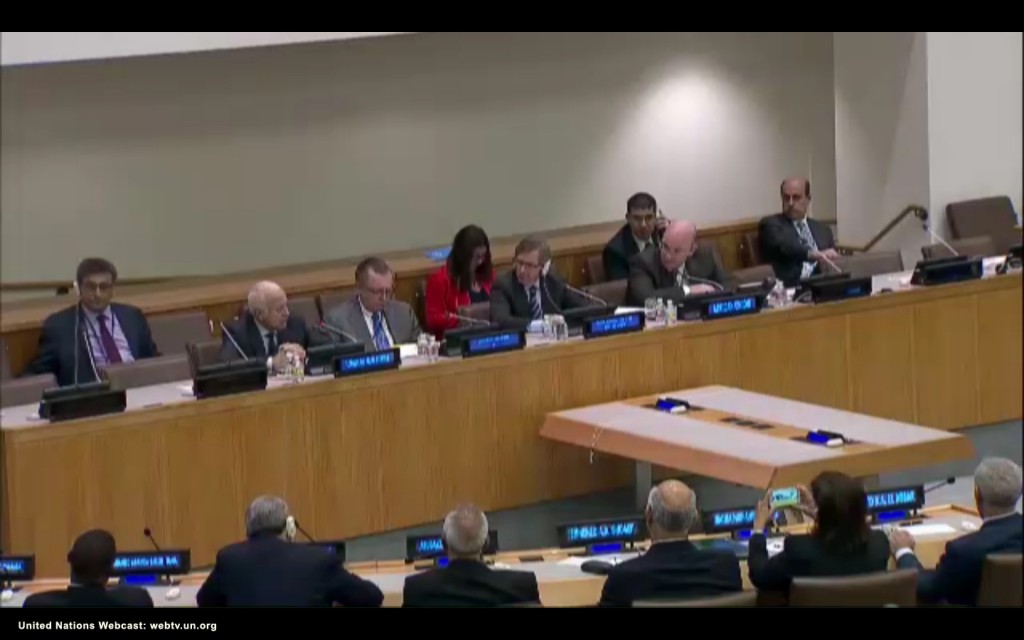The united spirit that UN special envoy Bernardino Leon has craved throughout a year of failed Libya peace talks finally arrived today – not from Libyan leaders, but the international community.
At a conference at the UN General Assembly in New York, delegate after delegate spoke of their wish for Libya’s leaders to endorse Leon’s plan for a government of national accord.
The Spanish-born diplomat had originally arranged this meeting for two weeks ago, intending to celebrate the signing of a peace deal he has worked so hard to achieve. In the event, foreign ministers and diplomats did not hide their disappointment that it had failed.
John Kerry, the U.S. Secretary of State, led off by insisting that the more than three dozen nations present were speaking with one voice, and that this voice was calling for peace.
All the other nations, a rich ensemble of foreign ministers and diplomats, echoed his call that the peace plan, now in its seventh draft, be accepted by all sides in Libya with no more changes.
The partial exception was Russia, whose own representative mentioned the need to adhere to the 11 July initialing of a previous draft peace plan, one more favourable to the House of Representatives.
But he too joined states as various as Mali and Morocco, Nigeria and Norway, Jordan and Germany, in asking Libya’s leaders to back the plan, crafted over 12 months of tortuous diplomacy by Leon.
Secretary General Ban Ki Moon, chairing the meeting, made his own strong call for the plan to be signed: “The violence of the past year and a half is leading Libya down a path of death, displacement and destruction,” he said. “Sadly, this is largely the result of rival groups who insist on putting petty concerns above those of the Libyan people. They are denying their country a future and have made Libya a base of instability, and a threat to regional and international security.”
Meanwhile the 23-strong team of Libyan delegates who have negotiated the plan with Leon watched in silence.
Had Libya’s two parliaments approved the peace deal, the delegates would have been allowed speeches, shaking hands and getting praise, maybe even garlands of flowers, from assembled diplomats.
As it was, even Libya’s UN representative, Ibrahim Al-Dabashi, was not invited to speak, perhaps in case his presence would see opponents in the fragile peace process complain.
For Leon there was consolation from the fact that Turkey and Qatar, backers of Libya Dawn, and Egypt and UAE, supporters of the HoR, each spoke with one mind, urging peace in the interest of preventing chaos overtaking Libya.
What was missing from the multitude of speeches, most of them praising Leon and promising Libya “full support”, was any suggestion of what will happen if Libyans miss their next “final” deadline for making a peace plan, which is now 20 October.
The day after that date, the mandate of the House of Representatives expires and Libya will lose its internationally recognised government, unless the parliament votes itself an extension of office.
Diplomats say such a move would raise questions about the HoR’s legitimacy and perhaps foreign backing. However HoR staffers point out that the previous parliament, the GNC, did the selfsame thing, marching on past its own mandate in February last year with no change to its recognition status by the international community.
The only iron in the otherwise velvet UN glove was the threat of sanctions aimed at those obstructing the peace process. Following similar threats from the Netherlands and Norway, British Parliamentary Under-Secretary of State for Foreign and Commonwealth Affairs Tobias Ellwood said those obstructing the peace deal would be “held accountable.”
The problem is that for this to happen, there first has to be a peace deal and for now there is no such thing. Many speakers alluded to the rising humanitarian suffering of ordinary Libyans, to the thousands of migrants leaving its shores, and to the growth of IS, with delegates from Tunisia, Mali and Malta worried terrorism will spill over into their countries.
Kerry insisted Libya’s delegates must “within days” choose a new prime minister for the unity government, the last step in the talks process,,a reference to peace talks to begin on Monday in back in the Moroccan resort of Skirhat.
After that, Leon will have 15 days to persuade both parliaments to sign the deal before the final “final” deadline.
Yet watching the assembled dignitaries roll through their speeches, high on rhetoric and low on detail, was to feel that for Leon, the peace ship has already sailed.
All his energy and purpose these past months was spent working up to this point, the grand presentation of a peace accord before the greatest debating chamber on earth.
In the end, no amount of cajoling and pleading could persuade Libya’s factions to agree the deal in time. The lack of leverage on display at the UN will convince Libyan leaders that they can miss the 20 October deadline without penalty. In all likelihood, that deadline will therefore come and go, the UN plan will be discarded and work will begin on a fresh UN plan, probably by a fresh UN envoy, in the months to come.
In these grand UN debates, symbolism is all important – indeed, the UN is built to symbolise peace, freedom and human rights. Many Libyans will not have missed what was perhaps the defining moment of the morning, which was when Ban walked out. Handing over the chair to Leon himself, the Secretary General explained that he had other business to attend to, which was to “say goodbye” to important foreign dignitaries leaving the UN after the week-long conference. More important than taking a key debate on Libya’s peace process?
By Hadi Fornaji.
https://www.libyaherald.com/2015/10/02/un-world-foreign-ministers-beg-li...


